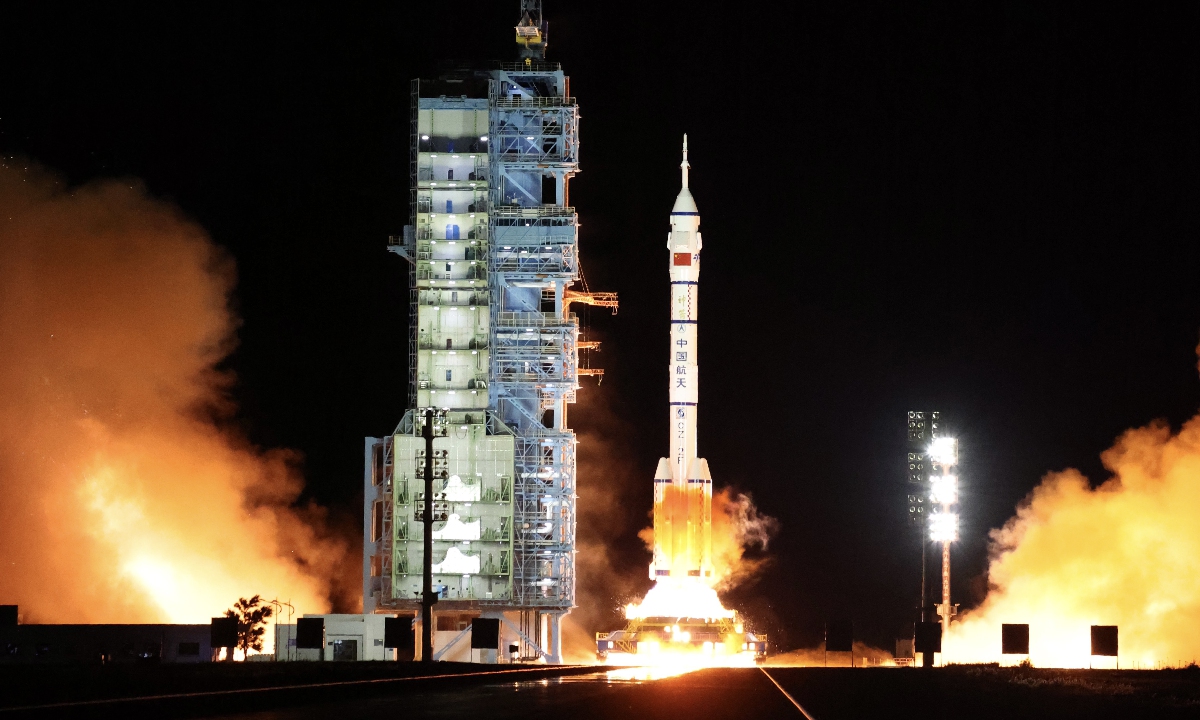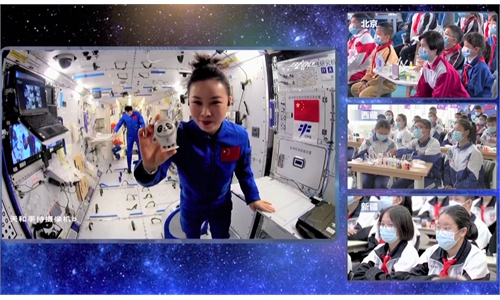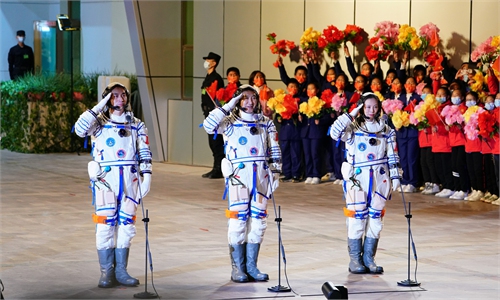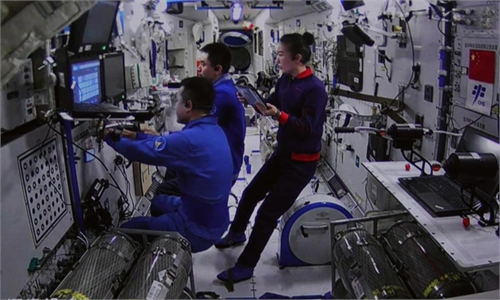Chinese celebrate Intl Day of Human Space Flight in anxious wait for Shenzhou-13's return

Shenzhou-13 Photo:Deng Xiaoci/GT
As Tuesday marked the International Day of Human Space Flight, Chinese netizens recounted the thrilling moments of their country's aerospace industry during the past year, while waiting anxiously for the return of their Shenzhou-13 heroes, who have worked and lived in China's space station for six months and are expected back on Earth in a few days.
A video that went viral on Chinese social media platforms on Tuesday put together highlights of the country's aerospace achievements since the establishment of China's very first satellite launch center in Jiuquan, in Northwest China's Gansu Province in 1958.
Embarking on an arduous yet fruitful journey in developing its own aerospace capabilities, China launched its first satellite, Dongfanghong-1, or "the East is Red," into space on a Long March-1 rocket on April 24, 1970, making China the fifth country in the world to independently develop and launch artificial satellites.
In 2021, China scored 55 orbital launches that topped the US to become first in the world. In the manned spaceflight sector, five launches were carried out in the past year that sent the core cabin, two batches of taikonauts and two batches of supplies to the country's space station, wrapping up the key verification stage of the station.
In the area of deep space exploration, China's first interplanetary exploration mission, the Tianwen-1 Mars probe, smoothly touched down on the Red Planet in May 2021, which made China the third nation to achieve such a feat after Russia and the US. In last October, China launched its first solar observation satellite, entering a new arena of space exploration.
As the Shenzhou-13's three crew members onboard China's space station prepare for their departure, they are seen in a video released on Tuesday repacking their belongings, including fitness equipment, laboratory supplies and maintenance parts, and putting them back in the designated locations. Some items may also need to be fixed to the walls to avoid floating and slipping, authorities previously said.
Experimental data and samples also need to be "packed" and brought to Earth. There will be a thorough "house-cleaning" to sort out all kinds of waste produced during the mission.
In footage captured by Ye Guangfu, his colleague Wang Yaping is jumping a rope in the microgravity environment, gradually floating and turning upside down with a big, childlike smile on her face. Netizens who are amused to see such a scene said that she must be very happy knowing that she will rejoin her family soon, and they welcomed her return to Earth with love and flower emojis on China's Twitter-like Sina Weibo.
https://m.weibo.cn/status/4757368448222795?wm=3333_2001&from=10C3593010&sourcetype=weixin
A post from China Central Television said on Tuesday that Chinese can take pride in their "surprise hit," advancing from a minor space player that got shut out from joining the International Space Station (ISS) some 20 years ago to a strong power that opens its arms to all global participants.
China's space station is the international space station in the true sense. The ISS created by Western countries and the US is actually "a club for the rich," Song Zhongping, a space analyst and TV commentator, told the Global Times on Tuesday.
Aimed at promoting the joint peaceful use of space by all countries, especially those from the developing world, China has always been willing to share its findings in space, such as recently retrieved lunar samples.
"Looking back on China's development in space, we have never relied on any other country and worked out a path of our own. As our space power grows, especially with the space station completing construction this year, our influence in space is getting bigger," Song said.
"We advocate, unlike space powers in the West, a peaceful way of using space to serve a community with a shared future for mankind, rather than militarizing or politicizing space to serve one's own interests or hegemony," Song said.
China also advocates more legislations around the space industry to ensure that it does not become another battleground, the analyst added.
The International Day of Human Space Flight is celebrated on April 12 each year. It was proclaimed at the 65th session of the UN General Assembly on 2011. Yuri Gagarin, the former Soviet Union's cosmonaut, crewed the Vostok-1 mission in 1961, completing one orbit around Earth over 108 minutes in the Vostok 3KA spacecraft. In today's Russia and some former Soviet states, the day is commemorated as Cosmonautics Day.
"Celebrating this day is to remind us that we explore space to serve peace, not war. Space is for all mankind, not only certain countries, even if they have more advanced technology. One cannot use space as their private backyard, let alone use it for malicious purposes. We have a responsibility to return space to a peaceful place," Song noted.



